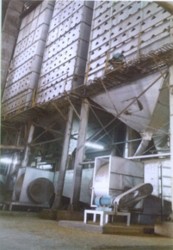It has been declared the winner of Caribbean Export’s inaugural ‘Green Exporter of the Year’ Award, but there was a distinct air of unfussiness to the response of the Nand Persaud Investments (NPI) official when congratulations were offered.
Such accolades do not come Guyana’s way too frequently so that when they do they are invariably attended by a generous measure of celebration. With NPI one gets the impression of an establishment that is not unfamiliar with success and therefore inclined to take it in stride.

The citation for the Caribbean Export award recognizes NPI for its “investments in green technologies” and for integrating alternative energy solutions into its operations leading to export success. This comes against the backdrop of what frequently is a clamour by much of the rest of Guyana’s manufacturing sector for a more reliable national fossil fuel infrastructure and for a hydropower solution to their energy woes. NPI has found a way around the single biggest challenge facing the productive sector in Guyana and it can hardly denied that the accolade is richly merited.
When NPI first opened its doors in 1987 to provide the agricultural sector with essential machinery it might well not have been able to project that its expansion would have been so rapid. Its rice milling complex emerged in 1992 and since then it has trotted out a slew of new entities including its international communications facility, its packaging and plastics plant, its fertilizer, seed paddy and wholesale and retail operations and its milling complex.
When it first entered the rice sector, NPI’s milling capacity was limited to one tonne of rice per hour. These days it has upped its production capacity to six tonnes of parboiled rice and eight tonnes of white rice per hour. Perhaps more significantly, it has been able to link its significant production to, among other things, its breakthrough in power generation.
But increased production arising out of enhanced efficiency is not the company’s only hallmark; NPI has invested in both the technology and the skills that allows it to recycle its paddy shell to power its boilers and furnaces.

Twenty-two per cent of the paddy that NPI processes is converted into shell and in most milling operations shell ends up on landfill sites. Last year, of the 19,061.27 metric tonnes of shell produced during NPI’s processing operations, 11,436 metric tonnes were used to feed the company’s boilers and furnaces. Since most rice mills use timber as a source of fuel, NPI said, its paddy shell fuel option saved approximately 388.77 hectares of forest last year. This year, the company is targeting 130,000 metric tonnes of paddy for processing and it says that its specially designed, India-manufactured furnaces and boilers using paddy shell as fuel are expected to contribute even more generously to forest conservation.
Arguably, every inch as noteworthy has been the substantial local, regional and international success which NPI has secured in the marketing of its Karibee rice. The company’s own advertising tag line boasts its identity as “the home of Karibee.” Over time, and more than most other locally manufactured products, Karibee has taken the local, regional and international markets by storm, Apart from being the preferred brand for thousands of households in Guyana, Karibee has made a name for itself on export markets across the region, Europe and North and South America.
The company currently sits on a financial base of US$55 million, but its focus remains on constantly reinventing itself. It has long reached a stage where it wants to be about much more than rice. These days, NPI is partially preoccupied with deeper enquiry into green technologies including the pursuit of feasibility studies into alternative energy. The rice sector, and perhaps even other industries, NPI believes, can benefit from its accomplishments.





